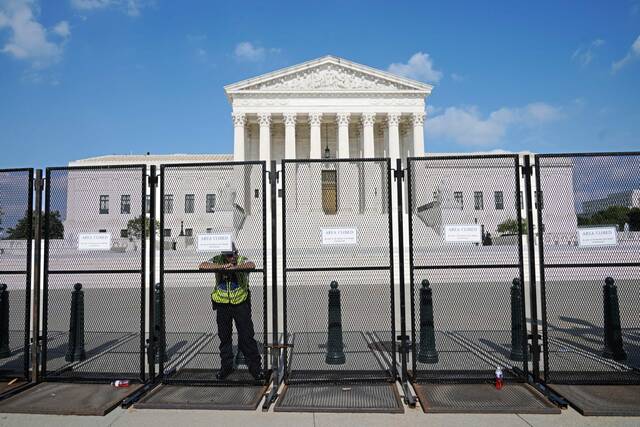Abortion decision will lead some to question Supreme Court legitimacy, experts say
The U.S. Supreme Court’s decision to overturn the 50-year precedent that was Roe v. Wade and roll back abortion rights in this country could cause many Americans to question the court’s legitimacy, legal experts and constitutional scholars said Friday.
The scholars said nothing has changed in American jurisprudence to lead to the reversal of Roe other than the makeup of the court.
“To have faith in a court, you have to believe the court is acting on principle and basing its decisions on ones that have come before,” said Sara Rose, the deputy legal director for the ACLU of Pennsylvania. “Nothing has changed with respect to society or people’s opinion on abortion — other than the composition of the court.”
Jerry Dickinson, a constitutional law professor at the University of Pittsburgh, agreed.
“This is going to have long-term implications for the public’s perception of the court and the legitimacy of the court,” he said.
On Friday, the U.S. Supreme Court released its decision in Dobbs v. Jackson, a case out of Mississippi in which the legislature there set a near ban on abortions at 15 weeks.
In the opinion written by Justice Samuel Alito, the court majority said there is no fundamental right to abortion — contrary to what the court said in Roe in 1973.
“Roe was egregiously wrong from the start. Its reasoning was exceptionally weak, and the decision has had damaging consequences,” the majority wrote. “The Constitution makes no reference to abortion, and no such right is implicitly protected by any constitutional provision.”
Dickinson said this is “the first time the Supreme Court has ever overturned or reversed a longstanding, well-established fundamental right.”
The Roe decision was grounded in the 14th Amendment, which protects individual freedoms.
“There are certain areas so fundamental to individual liberty that the government is restrained from interfering in those rights,” Rose said.
When the Roe case came about, Rose said, the U.S. Supreme Court recognized the important interest for a woman to control her own body and health care and then balanced it with the government’s interest in protecting life. That is how the rule on fetal viability came to be, she added.
The Dobbs decision leaves it up to individual states to determine whether abortion should be legal. Friday’s decision will trigger bans on abortion in 13 states.
“The only thing standing between the right to abortion in Pennsylvania and the Legislature is Gov. Wolf,” Rose said. “If a Republican is elected governor, and the Legislature stays the same, we will have an abortion ban in Pennsylvania.”
‘Unprecedented’ decision
Traditionally, Dickinson said, the Supreme Court has been in the business of expanding and strengthening fundamental rights based on the Constitution.
“Here, the court has done something unprecedented in that it has eliminated a fundamental right it established 50 years ago,” he said.
Dickinson said he thinks that shows the court is willing to roll back additional privacy rights. In his concurring opinion Friday, Justice Clarence Thomas wrote that the court “should reconsider” its decisions in other substantive due process rights cases such as the right to contraception, same-sex relationships and gay marriage.
“Despite the majority’s insistence this opinion won’t impact other 14th Amendment due process rights, there’s no principled way to distinguish the right to abortion from those other rights,” Rose said.
The Dobbs decision could also have implications for people who choose to pursue in vitro fertilization to conceive, she said.
“If the court says that the state has an interest in fetal life that outweighs a parent’s right, you can easily see a state legislature saying you can’t destroy embryos once they’ve been created,” Rose said.
Constitutional ‘wrecking ball’
Rose said it appears there is “a big gap where the court decisions are going and where public opinion is going.”
Dickinson said the decision in the Dobbs case — as well as another out of New York earlier in the week expanding gun rights — appears to be out of step with public opinion.
A Pew Research Center survey released in June showed 61% of U.S. adults think abortion should be legal in all or most cases, while 37% think it should be illegal in all or most cases.
Dickinson wonders if the construction of the court has given it too much power.
“I think this is the antithesis to our constitutional democracy,” Dickinson said. “Courts are to be arbiters of our democratic processes, not decision-makers.”
Harry Litman, who previously served as U.S. Attorney in Pittsburgh and clerked for former U.S. Justice Thurgood Marshall, said the court has no more power now than it did in 1803.
But, he said, “Five people of a like mind can take a wrecking ball to the Constitution. It’s rare when it happens, but, when it does, it brings disrepute to the court.”
The court already has been on the receiving end of significant public criticism in recent years, Litman said, and this will only make it worse.
“It’s hard not to see this as another colossal hit,” he said. “It’s a very big body blow to the court.”
Paula Reed Ward is a TribLive reporter covering federal and Allegheny County courts. She joined the Trib in 2020 after spending nearly 17 years at the Pittsburgh Post-Gazette, where she was part of a Pulitzer Prize-winning team. She is the author of “Death by Cyanide.” She can be reached at pward@triblive.com.
Remove the ads from your TribLIVE reading experience but still support the journalists who create the content with TribLIVE Ad-Free.

